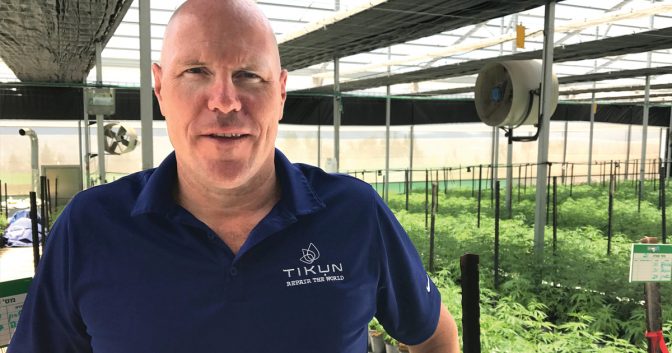Israel’s Tikun Olam Making Moves in the U.S. and Canada

In Hebrew, “tikun olam” means to repair the world. It’s a major precept of Judaism—and it’s also the name of Israel’s most prominent medical- marijuana company, now planting seeds around the globe. In the United States, it already has retail outposts in Nevada and Delaware.
Tikun Olam, which was founded in 2007, controls nearly 40% of the Israeli medical-marijuana market. Medicinal cannabis is fully legal in Israel and supported by both the government and academia. In fact, THC and various other compounds in the cannabis plant were discovered in Israel by now 87-year-old chemist Raphael Mechoulam, who continues to work at Hebrew University in Jerusalem.
“We’re actively working toward developing new genetics to work on efficacy and assist the patients in Israel still operating with our nurse-run clinics in order to better provide the right dosage and strains for the patients who are referred to us by the Ministry of Health,” Stephen Gardner, Tikun Olam’s chief marketing officer, tells Freedom Leaf. “We’re also continuing to do some other clinical trials in Israel, specifically with our strains.”

In addition to flower, Tikun’s product line includes tinctures and concentrates.
Because the Israeli medical-marijuana program fosters collaboration among cultivators and researchers, Tikun Olam has been able to develop various strains to treat the specific needs of the more than 10,000 patients who’ve signed up to use the company’s products over the past decade. Under the Israeli program, patients must commit to a single cannabis producer. Hence, companies like Tikun Olam are able to find out exactly what their patients need based on their ailments, and create medicine accordingly.
“We genetically develop [the strains] to improve patients’ symptoms and conditions,” Gardner explains. “In that time, we’ve created the world’s largest database of clinical or observational data to understand the efficacy of these products for the symptom relief of the patients.”
In the U.S., Tikun Olam is also working with partners to develop similarly specialized strains. But Gardner acknowledges difficulty with moving into the States. “It’s like 50 individual countries,” he observes about America’s patchwork of cannabis regulations. It’s already teamed up with First State Compassion Center in Wilmington, Del. and Canopi in Las Vegas, and is looking to expand into several more states in the next year.
Tikun follows standard operating procedures—from growing to extraction methodologies—to have a standardized product line. “The goal is to have consistent and reliable products,” he says. “If you’re a manufacturer, you need to have the same type of process in order to deliver the same type of product from coast to coast. We want to have these grow techniques consistent across our markets.”
Tikun has six flower strains available at the Delaware and Nevada locations. Alaska, Eran Almog, Erez and Or are high-THC varieties (20% THC to 1% CBD); Avidekel is their famous high-CBD strain (18% CBD to 1% THC); and Midnight is closer to 1:1 (12% CBD and 10% THC). They were developed specifically to target cancer, pain, post-traumatic stress disorder; Parkinson’s, Crohn’s and Alzheimer’s diseases; AIDS/HIV, colitis, arthritis, depression, and many other disorders.
 TIKUN OLAM’S STEPHEN GARDNER: “Hopefully, someday the restraints on research will be so we can demonstrate here in the U.S. the efficacy of our strains.»
TIKUN OLAM’S STEPHEN GARDNER: “Hopefully, someday the restraints on research will be so we can demonstrate here in the U.S. the efficacy of our strains.»
“We do genetic profiling and testing, working with labs in each state where we operate in order to get consistent THC, CBD and terpene profiles,” Gardner adds. “In each state, we have to work through multiple tests to ensure that all of our products are free of pesticides and mites, and make sure we’re providing a parallel product in terms of cannabinoid profiles.”
Tikun also sells tinctures and capsules made from its Alaska, Avidekal, Erez and Midnight strains in multiple THC:CBD formulas. The CO2-extraction method retains the terpenes and enhances the entourage effect, the symbiotic relationship among all the compounds in cannabis, including cannabinoids, terpenes and flavonoids (the phytonutrients that give the plant its green hue and other colors).
“[In America] we’re not able to test in terms of working toward the observational or clinical research that’s being done in Israel,” says Gardner. “It’s difficult to take what we’re doing here in America and provide that level of research. Hopefully, someday those restraints will be lifted, so we can demonstrate here in the U.S. the efficacy of those strains.”
In Israel, Tikun Olam has had the benefit of working with and analyzing a database of more than 10,000 patients. But, in the U.S., restrictions make it difficult to conduct clinical research at such a sophisticated level.
“In specific nursing clinics, we sit down with patients, understand what treatments they already had and what their conditions were, and have a quality index in terms of their symptoms,” Gardner explains. “We prescribe them based on that information, what the most efficient strains are. Then we go back after a month and do a quality-of-life review, understanding in terms of symptom relief.
“Although it’s a little bit observational, we’re able to understand with empirical data what strains are assisting them. Then that process is done again after six months, so we can use this research data and observational data to better assist patients on the efficacy of these strains. We work with that data to develop genetics to provide more medicinal benefits to the patients.”

Healthy Tikun Olam-grown plants can help repair the world.
In the U.S., Tikun lets budtenders know which strains can be most helpful for certain symptoms. “We’re not saying our strains are the only ones to provide that relief,” Gardner notes, “but it’s a way to provide customers some educational research understanding.”
For instance, Tikun research indicates that Erez is good for Crohn’s, ALS and pain; Or works for Parkinson’s, nausea and loss of appetite; and Avidekel is best for cancer, colitis and fibromyalgia.
Read our «Tikun Olam Taste Test» here
In Sept. 19, Tikun Olam announced another U.S. collaboration, with MariMed, a cannabis management firm based in Springfield, Mass. Together, they plan to bring Tikun’s proprietary strains and standard operating procedures to shops in Massachusetts, Rhode Island, Maryland and Illinois in 2018. Two months later, on Dec. 19, they inked a licensing deal with the Washington, D.C.-based medical cannabis cultivator Alternative Solutions, which provides products for the District’s five legal dispensaries. Tikun Olam is also making moves in Germany, Australia and Canada, where the company has a partnership with Med ReLeaf.
“We’re great advocates for the medicinal benefits of cannabis,” Gardner says. “We’ve had a head start. We’ve been able to do this for 15 years, which provided us with the ability to do more clinical trials and research. We’re proponents and advocates for trying to destigmatize cannabis and demonstrate that there are true medicinal benefits from this plant.”
If you enjoyed this Freedom Leaf article, subscribe to the magazine today!

